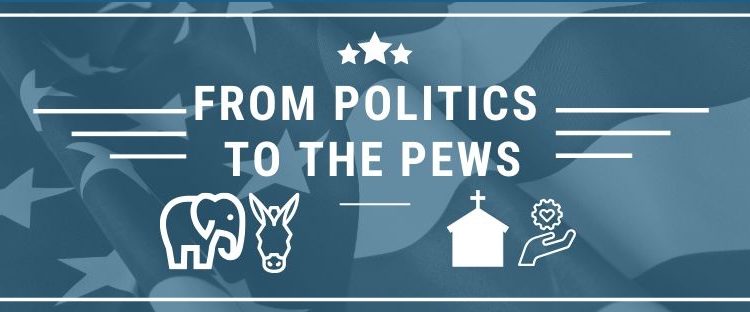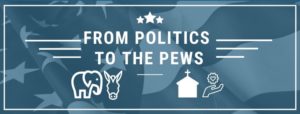Introduction
As a progressive congregation in a state that strongly identifies as conservative and evangelical, Mayflower Congregational United Church of Christ in Oklahoma City offers an unexpected expression of Christianity and voices it everywhere from the pulpit to city hall to the state house. Mayflower’s commitment to social justice, civil rights, and community organizing is rooted in progressive theology.
The congregation experiences notable increases in attendance and membership immediately following election cycles, protest marches, Planned Parenthood volunteer trainings at the church, or when Mayflower UCC’s pastor speaks publicly on behalf of immigrants or LGBTQ rights, indicates shared values. Its ministry and work for progressive policies, reproductive choice, just immigration reform, and marriage equality are often named as reasons why people join the congregation, who have overwhelmingly left religious traditions with more fundamentalist or conservative theologies. They come to Mayflower UCC knowing what they do not believe, as well as what theological claims have been harmful to them. While they are able to name the values they share with the congregation based on its ministries and political action, they are not usually able to articulate how progressive political commitments have their foundation in progressive faith and theology. Their reasons for participating in the work and mission of the church and/or joining as a member are rooted more in shared values expressed through political action than in theological understanding or uniformity of beliefs.
As a pastor, how do I more deeply root people in ground of progressive theology, which will sustain them regardless of partisan winds?
Theories
For Mayflower UCC’s largely white, post-evangelical heartland congregation, political identity is more salient than religious identity. For Mayflower to strengthen the religious identity of the congregation, it must connect progressive politics to progressive theology – defined as the study of God and practice of beliefs which (1) conserves the prophetic tradition by questioning orthodoxy, (2) interprets scripture with intellectual honesty, (3) orients itself towards social justice, and (4) practices theological humility.
This is supported by two ideas: the age of authenticity and life-cycle theory of religious and political identify formation. The theory of the age of authenticity, according to Charles Taylor, proposes that people are increasingly associating only with those organizations with which they share values. The life-cycle theory of religious and political identify, as proposed by Michele F. Margolis, formation re-examines assumptions of which identity is stronger and why, and speaks to why political values could be used as a motivator for religious formation.
Responding to these theories, Mayflower UCC should be able to use existing partisan identity and political commitments to strengthen religious identity and commitments of churchgoers in programs of faith formation, ultimately moving people away from being loyal partisans to faithful politicos (politically engaged people of faith) whose progressive politics are rooted in progressive theology.
Method & Insights
To explore the connections between politics and faith and the possibilities of using faith formation programs that engage progressive theology and political topics, I formed three study groups around three different topics: reproductive choice, immigration justice, and marriage equality. These study groups were put together from self-selecting volunteers for the project, who knew that they were participating in a research project that focused on the interplay of political/partisan commitments and progressive theology. Each study group met three times, using the Marshall Ganz’s public narrative framework of “self-us-now” storytelling with the hope of “translating values into action.”[1] Participants were also given reading assignments that approached the topic from both conservative and progressive theological perspectives.
Prior to meeting the first time, participants completed a pre-study group survey about the formation of their religious and political identities, the importance of those identities, their current understanding of the topic from both political and theological perspectives, and confidence engaging in the topic from each perspective. Participants also completed a post-study group survey to gauge the impact of the study group and reading materials.
The narratives among group participants overwhelmingly reflected the life-cycle theory of religion and politics in that (1) communal political experiences helped form their partisan identity by early adulthood; (2) most of them were not intentionally exploring spirituality and/or religion or attending a house of worship between ages 18-26; (3) decisions around marriage and having children as well as group affiliation prompted them to consider joining a faith community; and (4) their political worldview and partisan commitments pushed them to seek a church that reflected those shared values.
The insights from the pre and post-study group surveys and reading materials showed that the study group slightly increased in the importance of participants’ political identity. Most participants bluntly admitted that the study group simply reinforced their already strong political identity. When asked if work with the study group changed the importance of their religious identity, the average score of the participants’ responses revealed a significant increase. Notably, the average increase across all groups in increased importance of religious identity after working with the study group was twice that of the increase in importance of political identity. When asked about their level of confidence engaging in conversation or action on the issue from a theological perspective, the average response across all study groups showed a significant increase in confidence. While small groups are not typically associated with white, progressive mainline churches, participants reported positive experiences of the study groups. More than a few reported feeling anxious or intimidated beforehand, but reported that the study group created a stronger sense of being part of a community.
Based on the partisan identity that people bring to Mayflower UCC and the desire to participate in a faith community that explicitly shares their pre-existing values, it would benefit individuals and the congregation as a whole to engage politics in faith formation, both for authentic living and to help progressive churches with effective discipleship and participate in shaping community in faithful ways.
Politics in Church
Having established that people not only bring their political commitments and partisan identities with them to church, but that people with progressive political commitments may actually choose a congregation based primarily on the shared political values, it is vital that progressive congregations respond to these realities. As discussed in the previous section, pre and post-surveys, interviews, and study groups with churchgoers at Mayflower UCC revealed that faith formation programs that focus on progressive theology and political topics can deepen religious identity, strengthen theological engagement with the world, and nourish relationships.
Progressive theology can transform loyal partisans into faithful politicos, whose values are rooted not in partisanship prone to making idols out of candidates and elected officials or that demands “us vs. them” gamesmanship, but in the study of God and practice of beliefs which (1) conserves the prophetic tradition by questioning orthodoxy; (2) interprets scripture with intellectual honesty; (3) orients itself towards social justice; and (4) practices theological humility. Studying God and living out faith commitments with the above five characteristics as guide rails can ensure that using politics in faith formation programs does not simply repeat the mistakes of the Religious Right or Moral Majority.
Conclusions
Paying attention to when people show up and the reasons why they show up is important – whether it is post-election, after a particular news event, or following any other public engagement between the church and community, preliminary conclusions can be drawn about the values that might be shared between the church and an individual. Noting that increased attendance happened after election cycles, protest marches, Planned Parenthood volunteer training at the church, or when Mayflower UCC’s pastor speaks publicly on behalf of immigrants or LGBTQ rights, indicates shared values.
Connecting progressive politics to progressive theology also matters when considering long-time church members, for even those who self-identified as such and participated in the surveys and small group meetings reported increased importance of religious identity. They also spoke about stronger relationships with other small group members and plans to connect after the sessions were over – something they had not anticipated or would have done without participating in this first. In the context of a faith formation program that focused on connecting progressive theology and politics, churchgoers discovered shared faith and political commitments, and were inspired to plan action rooted in theological understanding.
Mayflower UCC’s response to people’s desire to live authentically and the political and religious life-cycle theory should be to further develop faith formation programs that teach progressive theology in the context of politics. This will create the opportunity for this progressive congregation to strengthen relationships between church members, increase the importance of religious identity and confidence engaging theology in politics, and generate opportunities for church members to make the widest and deepest impact possible in our particular context. In doing so, Mayflower UCC can transform loyal partisans into faithful politicos.
[1] Marshall Ganz, “Public Narrative, Collective Action, and Power,” in Accountability through Public Opinion: From Inertia to Public Action, ed. Sina Odugbemi (ProQuest Ebook Central: World Bank Publications, 2011), http://ebookcentral.proquest.com/lib/emory/detail.action?docID=692796.


Pingback: Committee On Ministry News & Leadership Transitions | Kansas-Oklahoma Conference UCC